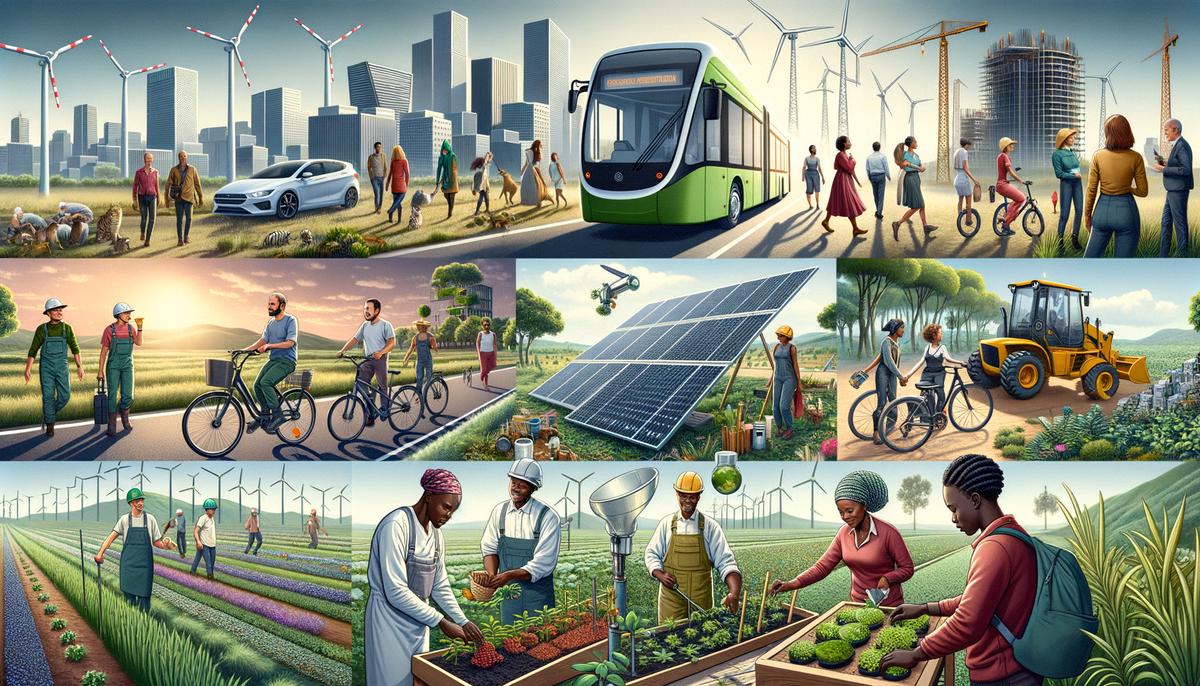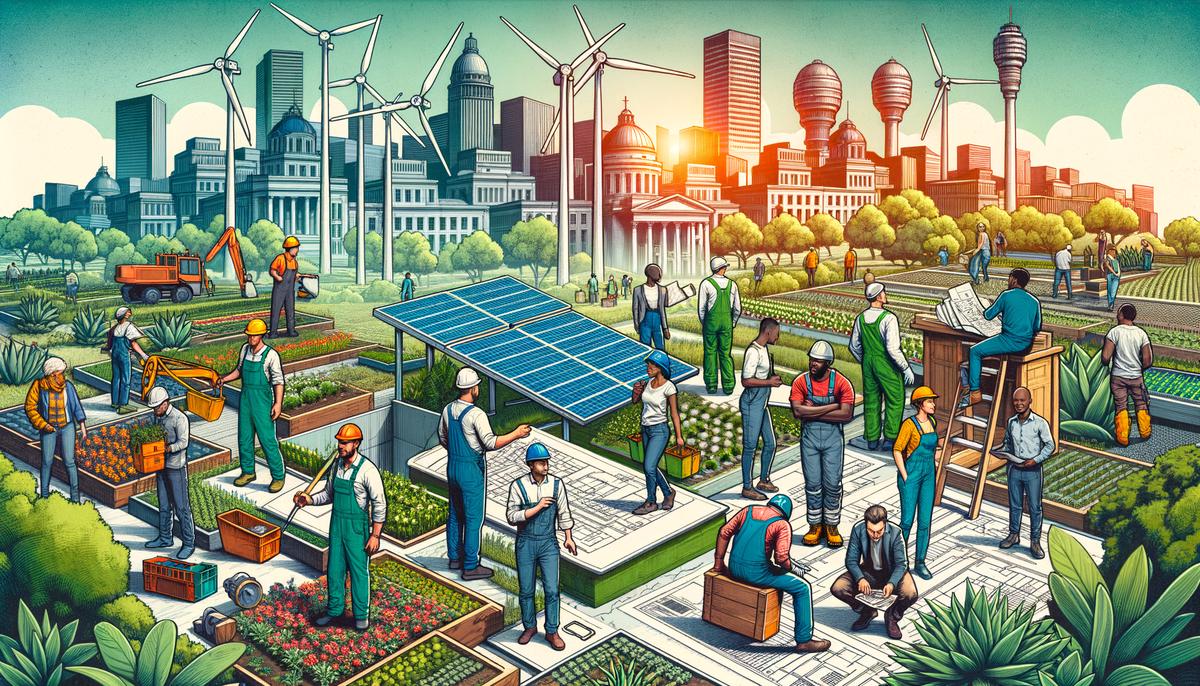
Joburg Climate Jobs Plan
Johannesburg is embarking on a transformative journey that intertwines environmental stewardship with socio-economic upliftment. This narrative unfolds within the city as it redefines its relationship with nature and its citizens. As we explore green job creation, emissions reduction, and sustainable urban development, a comprehensive picture emerges—one that positions Johannesburg as a city in transition, aiming to be a leader in the face of climate challenges.
Green Job Creation
Johannesburg’s climate action plan aims to promote environmental restoration and economic revitalization. A key aspect of this initiative is the generation of more than 400,000 jobs across various sectors, notably buildings, power, sustainable transport, and adaptation tied to nature-based solutions. This endeavor aligns with Johannesburg’s commitment to ecological sustainability and the betterment of its citizens’ livelihoods.
In the buildings sector, job creation is expected through retrofitting and upgrading infrastructures to meet energy-efficient standards. These activities reduce carbon footprints and spur demand for skilled labor, fostering a wave of green construction experts.
The power sector’s transition to renewable energy sources is another significant component. The installation and maintenance of solar panels and wind turbines require a specialized workforce, from engineers and technicians to researchers and sustainability consultants.
Sustainable transport focuses on reducing greenhouse gas emissions through the promotion of electric vehicles (EVs), enhancement of public transport, and development of cycling infrastructure. Roles in this sector include:
- EV maintenance technicians
- Public transport planners
- Workers involved in constructing bike lanes and pedestrian-friendly pathways
Adaptation and nature-based solutions offer employment in projects such as green roofs, rain gardens, and the expansion of urban green spaces. These jobs contribute to the city’s resilience against extreme weather events and provide crucial ecosystem services.
Central to the success of Johannesburg’s climate action plan is the concept of just transition, ensuring that jobs created are accessible to all citizens, especially marginalized communities. By fostering work opportunities across gender and socio-economic divides, the initiative aims to address past disparities while moving South Africa toward a greener future.
Johannesburg’s climate action plan underlines an integrated approach towards tackling unemployment and climate change simultaneously. By revitalizing key sectors through sustainable practices, the city sets an exemplary model for how urban areas can link economic development with environmental stewardship.

Public Support and Investment
Amidst Johannesburg’s journey to fostering a greener, more resilient city, public support emerges as a significant influence on the climate action plan’s trajectory. National polling reveals strong favorability toward greening the economy, with two-thirds of South Africans strongly supporting the channeling of government funds into urban green job creation1. This groundswell demonstrates a collective aspiration for environmental repair and an understanding of the broader socio-economic benefits that sustainable job creation harbors.
Achieving the goal of creating over 400,000 jobs across sectors necessitates robust investments from both governmental and private sectors. Public funds are pivotal for their monetary value and the signal they send, underscoring a collective commitment to transitioning towards a greener economy. It catalyzes confidence and incentivizes private sector stakeholders to join the green bandwagon.
Private sector engagement is indispensable. Unlocking private finance would serve as a catalyst, spurring innovation, expediting project implementation, and magnifying job creation outcomes. Private investment in green ventures represents a significant stride towards a new economic paradigm that privileges sustainability over short-term gains.
The investment needed is not so much additional as it is a reorientation of existing financial flows. Rather than sinking funds into carbon-intensive projects, the advocacy is for these investments to be re-channeled toward sustainable endeavors. Such strategic reallocation primes South Africa for reaching its ambitious 2030 climate targets and lays a sturdy foundation for societal transformative benefits.
Johannesburg’s venture into green job creation, underpinned by broad public support and strategic investments, exemplifies a proactive approach to addressing the challenges of climate crisis and unemployment. With national support as its bedrock and strategic investments as its pillars, Johannesburg’s climate action plan nurtures the promise of creating a greener, jobs-rich future for South Africa’s urban areas.

Impact on Vulnerable Communities
Johannesburg’s climate action plan, with its focus on green jobs and sustainable recovery, adopts a nuanced approach when considering its impact on vulnerable communities. The initiative aims to integrate resilience and inclusivity into the fabric of Johannesburg’s society.
Central to ensuring a fair distribution of the initiative’s benefits is the just transition principle, which acknowledges that while the move towards sustainability is imperative, it must not overlook the needs and rights of those historically marginalized. It mandates a pathway that elevates those at the lower rungs of the economic ladder, ensuring the green transition’s benefits are widely shared.
The strategic reach into the sectors of buildings, power, sustainable transport, and adaptation through nature-based solutions opens a broad spectrum of job opportunities. These sectors promise engagements that could fit various skill levels and educational backgrounds, thereby lowering entry barriers for those previously sidelined.
Workforce development and training become important pieces of this inclusive employment puzzle. Fostering skills in renewable energy, green construction, and urban resilience ensures that the move towards sustainability is not just a leap for the urban ecosystem but a step up for individual livelihoods. Special emphasis on empowering women, youth, and previously disadvantaged individuals in these training programs ensures that the initiative’s prosperity reaches through long-standing socio-economic gaps.
Accessibility to these green jobs is enhanced through supportive transition policies. These policies aim to smoothen the shift for workers from traditional to green sectors, supported by social protections and re-skilling programs. Thus, vulnerable groups stand protected not just from the adverse effects of climate change, but from the turbulences of an economy in transition.
Investment in climate adaptation strategies underscores another dimension of support for vulnerable communities. By strengthening resilience against floods, droughts, and heatwaves, the initiative encapsulates a dual benefit—shielding the most exposed populations from climate impacts while simultaneously opening new employment avenues in adaptation efforts.
Johannesburg’s climate action plan emerges as a testament to sustainable development that genuinely leaves no one behind. By linking the ecological revival to a comprehensive socio-economic upliftment, it pledges a greener and more equitable future.

Emissions Reduction Targets
Johannesburg’s Climate Action Plan (CAP) charts a bold course towards significant emissions reduction in the heart of South Africa. With far-reaching targets for 2030, 2040, and 2050, the city aims to reshape its urban landscape and align with global climate action goals.
In a commitment that resonates with the Paris Agreement’s vision for a sustainable future, Johannesburg has set ambitious targets:
- By 2030, the city aims to reduce its carbon emissions by 25% compared with 2016 levels.
- A 75% reduction target by 2040.
- The ultimate goal of net-zero emissions by 2050.
Behind these numbers lies a tapestry of urban actions, each thread woven with the intent of transitioning Johannesburg away from carbon-intensive practices. Through investments in energy efficiency, renewable energy, sustainable transportation, and green job creation, the CAP orchestrates a holistic approach where economic vitality and environmental sustainability are harmonious allies. This strategic ensemble plays a critical role in not only meeting but potentially surpassing South Africa’s national climate targets and aligning with the global objectives set forth by the Paris Agreement.
The CAP is a roadmap guiding Johannesburg through the challenges of urban development and climate mitigation. Each sector, from power generation to transportation modes, from infrastructure to job market practices, receives attention in this plan, uniting in a bid toward total emissions reduction. Through retrofitting buildings for energy efficiency, harnessing renewable energy, encouraging electric transport, and fostering green employment, Johannesburg is taking concrete steps toward constructing a sustainable future.
What gives these targets their deepest resonance is their harmonization with the principles of equity, accessibility, and just transition underlying every measure. The CAP brings together initiatives designed not just to green the environment but to ensure that every citizen, especially those in vulnerable communities, plays a tangible part in this transition.
As Johannesburg works towards these emissions reduction targets, the city exemplifies a central tenet of contemporary climate action: that cities can be leaders of ambition and hubs of transformation. Johannesburg’s CAP serves as an inspiring example, representing how concerted urban action can muster the collective strength needed to answer the call for global environmental stewardship, harmonizing progress and sustainability in an age that demands real change.

Training and Skills Development
Johannesburg’s Climate Action Plan is not just a compilation of ambitious targets and transformative pledges. It delves deeper, focusing on community empowerment through training and skills development initiatives. The plan recognizes that the success of a green economy depends not only on investment and infrastructure but also on its workforce, equipping citizens with green skills.
Aligning Aspirations with Practical Training
The Climate Action Plan resonates with historically underrepresented members of society. Women, youth, and previously disadvantaged individuals are at the center of this green economic reform. The plan understands that for environmental progress to be meaningful, it must create livelihoods and opportunities, cultivated through education and empowerment.
Specialized training programs tap into the diverse range of green jobs created by climate action endeavors. From apprenticeships in solar panel installation to courses in sustainable agriculture, Johannesburg offers a variety of training opportunities aimed at aligning individual aspirations with the collective environmental goals. The curriculum includes green entrepreneurship, eco-conscious engineering, and resilience planning.
Empowering Vulnerable Groups: A Special Focus
These initiatives focus on empowering women, youth, and the previously disenfranchised. Recognizing them as crucial contributors to the sustainable transition, the plan dedicates specific efforts to these groups.
- Workshops aimed at women entrepreneurs in the renewable energy sector seek to break traditional barriers of entry, encouraging female leadership in green enterprises.
- Youth engagement programs provide a platform for innovation, channeling the energy of Johannesburg’s younger citizens into sustainable development projects. These platforms foster a sense of environmental stewardship, nurturing a generation of eco-conscious leaders ready to guide the city toward its climate goals.
Implementing just transition policies, the plan ensures that nobody is left behind in this transformative process. These policies advocate for fair labor practices, social protections, and access to new green job markets with affirmative action for those traditionally marginalized.
Building a Sustainable Future: Johannesburg’s Path Forward
Training and skills development are key components of Johannesburg’s path to a sustainable future, a city where every citizen plays a role in achieving environmental goals. Through deliberate strategies embedded within the Climate Action Plan, Johannesburg lays the foundation for environmental progress, socioeconomic inclusivity, and empowerment.
As this narrative of resilience unfolds, it reinforces the core message: by harnessing collective power and potential through education and opportunity, Johannesburg is creating a roadmap to sustainability, equity, and hope for the generations to come.

Challenges and Opportunities
Navigating the Landscape: Challenges and Opportunities in Johannesburg’s Climate Action Plan
As Johannesburg implements its Climate Action Plan, which aims to create green jobs, reduce emissions, and build resilient urban landscapes, it encounters a complex interplay of challenges and opportunities. The city’s climate action journey involves overcoming obstacles while seizing promising opportunities, each measure a step toward sustainable urban development.
The Challenges
- The foremost challenge lies in financing these ambitious initiatives. Channeling substantial investment into green projects, while maintaining balance with the city’s economic priorities, requires careful planning. Persuading both the private sector and government to invest in climate action initiatives is a significant undertaking.
- Ensuring equitable access to this economic revival poses another multifaceted challenge. As green jobs emerge across Johannesburg’s landscape, the responsibility to distribute these roles fairly becomes paramount. It’s a complex task to ensure that these opportunities reach the marginalized communities.
- The unpredictable impacts of climate change present an ongoing challenge for urban resilience. Adapting to these ecological dynamics while staying committed to sustainability and inclusion adds layers of complexity.
Opportunities: The Positive Counterpoints
Every challenge presents an opportunity. The quest for investment provides an opportunity to redefine the urban economy’s reliance, shifting towards green energy, sustainable infrastructures, and innovative climate solutions. Johannesburg has the potential to emerge as a leader in economic innovation and environmental stewardship on the African continent.
Amidst the challenges of equitable job distribution, there is an opportunity to drive social transformation. Through targeted policies ensuring broad access to green jobs and focused initiatives for skills development in vulnerable groups, Johannesburg has the chance to foster an inclusive economic revival.
The impacts of climate change compel Johannesburg to develop resilient urban practices. In mitigating flash floods, the city finds opportunities to enhance its water management; in combating droughts, to refine its conservation efforts; in addressing heatwaves, to innovate in urban cooling techniques. Each adaptation measure is a step towards building a city resilient in infrastructure and spirit.
Concluding Thoughts
In drafting its Climate Action Plan, Johannesburg acknowledges the depth of challenges while seizing the breadth of opportunities. This climate action plan represents not merely an environmental commitment but a societal promise—a pledge towards an inclusive, greener, and resilient urban future. As Johannesburg navigates through trials and possibilities, it sets an example not just for itself but for cities worldwide that are formulating their own climate action strategies. This intricate balance of challenges and opportunities paves the way for a future where every action contributes to harmonious, sustainable prosperity for all.

Johannesburg’s Climate Action Plan is more than a blueprint for environmental conservation; it is a testament to the city’s commitment to fostering an inclusive, green economy. By combining initiatives that span from renewable energy adoption to comprehensive skills development, Johannesburg is crafting a future where sustainability and socio-economic prosperity align1. This narrative, filled with ambition and action, illustrates that the journey towards a greener future is not just a path we tread but a legacy we build together.

Share
Facebook
X
LinkedIn
Telegram
Tumblr
WhatsApp
VK
Mail